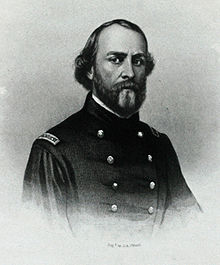Sullivan Ballou
Sullivan Ballou (born March 28, 1829 in Smithfield , Rhode Island , † July 28, 1861 ) was a lawyer , politician and major in the United States Army in the Civil War . He became known through a letter he wrote to his wife a week before the first battle at Bull Run .
biography
Ballou was the son of Hiram and Emeline (Bowen) Ballou, a Huguenot family from Smithfield , Rhode Island . Both parents died very early. He attended Phillips Academy boarding school in Andover , graduated from Brown University and then studied law at the National Law School in Ballston , New York . Ballou was a Republican and was elected to the Rhode Island House of Representatives, where he made it up to become President of Parliament.
When the war broke out, he immediately volunteered for the 2nd Rhode Island Infantry Regiment. In addition to his front service, his legal skills were also in demand here. Ballou and 93 of his subordinate soldiers were fatally wounded in the First Battle of the Bull Run. In order to better lead his soldiers, he rode in front of the regiment and was hit by a Confederate artillery shell. His right leg was torn away and his horse was killed at the same time. The fatally wounded major was taken from the battlefield and his leg was amputated.
Ballou died a week after the lost battle and was buried in the courtyard of nearby Sudley Church. After the battle, the area was occupied by the Confederates. According to witnesses, Ballou's body was excavated, beheaded and desecrated by Confederate soldiers. His body was not found. In place of his body, charred ashes and bones, believed to be his remains, were interred in Swan Point Cemetery in Providence , Rhode Island.
His wife Sarah never married again. She later moved to New Jersey with her son William and died in 1917. She was buried at her husband's side.
The letter
Ballou married Sarah Hunt Shumway on October 15, 1855. Their marriage had two sons, Edgar and William. The letter to his wife gained fame through the documentary The Civil War by Ken Burns , as an abridged version can be heard there.
Web links
- Sullivan Ballou in the database of Find a Grave (English)
- The letter to his wife (Wikipedia)
| personal data | |
|---|---|
| SURNAME | Ballou, Sullivan |
| BRIEF DESCRIPTION | American lawyer, politician and major in the Northern United States in the Civil War |
| DATE OF BIRTH | March 28, 1829 |
| PLACE OF BIRTH | Smithfield , Rhode Island |
| DATE OF DEATH | July 28, 1861 |
